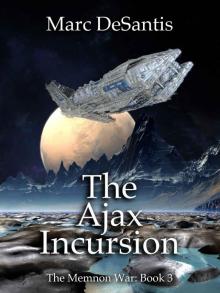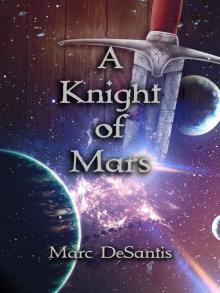- Home
- Marc DeSantis
A Knight of Mars
A Knight of Mars Read online
A Knight of Mars
Marc DeSantis
This book is a work of fiction. The characters, incidents, and dialogue are drawn from the author's imagination, and are not to be construed as real. Any resemblance to actual events or persons, living or dead, is entirely coincidental.
Copyright © 2016 by Marc DeSantis
All rights reserved. No part of this book may be used or reproduced in any manner whatsoever without written permission, except in the case of brief quotations embodied in critical articles and reviews.
“Ophirian wines are undoubtedly the finest on Mars,” my father opined, none too humbly, his speech clipped and precise, “and my most recent vintages are, I dare say, some of the best that I have ever produced.”
“I have heard nothing but superlatives about Ophirian wines,” answered Sir Rodney. “Alas, that my lands are so far distant from yours that it is a rare thing for one of your district’s bottles to appear in our markets.”
Sir Rodney, a Tithonian knight, was a stout man, middle-aged, with an iron-flecked beard and badly-scarred forehead. He appeared to be every inch the professional warrior, and sat astride his horse as one who had spent his life in the saddle, easily, and unthinkingly confident. My father, Jacques Surcouf, and I, Claude, had been making our way through one of the lesser vales that branched off of the Valley of the Mariners when we were but lately joined on the road by the good knight Rodney and his young squire, Edward. Our pilgrimage to the Shrine of the Six had been thus far uneventful, but the added presence of a well-armed knight, with his sword, musketoon, and brace of pistols, was very welcome. Also, accompanying us on the journey from our home of Artemisia were Timothy the surveyor, and his strong-minded wife, Gwendolyn, a seamstress.
The territory outside of the settled lakelands was dangerous, filled with brigands and other desperate men. They harried pilgrims on the road where it passed close to the frontier, that invisible but so very real border where the civilized world chafed raw against the wilds.
Sir Rodney and my father were of a similar age, and they talked of their professions. Sir Rodney had seen service with a half-dozen different dukes and barons throughout the Valley, and had most recently served as a commander of heavy horse with Baron Bradshaw of Isca. “I would think that a Tithonian knight would not need to seek out wars so far from home,” my father said. “You must have crossed much of Mars to find employment for your sword, good sir.”
Sir Rodney wore a disappointed look. “So right you are, Mr. Surcouf. Tithonium has been at peace for much of my life, now that King Albert has solidified his hold on the region around the lake. All of the lesser lords bow to him, and acknowledge his overlordship. The Battle of Parnassus in the Noctis Labyrinth was a crushing defeat for Tithonium’s enemies. Ever since, the Iusians have been quiescent, and challenge the might of Tithonium no more.”
“The High King has brought peace and tranquility,” Sir Rodney continued, “but this has also depressed the local market for my military skills. So I have been compelled to go abroad from my home country to seek commissions. In my travels I have ridden with the Knights of the Utopia Planitia, and sailed with privateers on the Hellas. I fought also for the Sea Lords of Rigomagus on the Argyrean. Lately, I have served with your own King Louis of Ophir at the battles of Cyrene, Corinth, and the Skamander, and then lastly with Bradshaw at Argos. You have heard of them, yes?”
My father’s eyes widened. “I have indeed good sir! I take it then that you are Sir Rodney of Gordium, the hero of the Battle of the Skamander River?”
Sir Rodney smiled broadly, his satisfaction readily apparent. “I am the same. Fame and fortune have ever been my twin goals in this life. A man of the sword must maintain a high reputation for wielding one,” he said as he tapped his richly decorated scabbard, “if he is to be employed again.”
“You have indeed found fame, Sir Rodney. Songs of your exploits at the Skamander were sung in the halls of Artemisia all through the winter last.”
“You have warmed my heart then.” Sir Rodney paused briefly. “Artemisia,” he mused. “Why is it that I know that name?”
“Perhaps because that is the home of my own vineyards, where I have my grapes pressed and my wine aged?”
“Maybe, maybe,” Sir Rodney said softly. “What is the name of your bottling?”
“Why, it is Chateau Surcouf d’Ophir,” my father answered.
“Of course!” exclaimed Sir Rodney, his face alight. “I am sorry that I did not put your name and that splendid wine together when we first met. I am more than familiar with your wine, my good man. It was served by King Louis at all of his banquets. We ate and drank very well there. I’ll also have you know your wine was the first to run out. It was our loss.”
My father beamed with pride. “I have always striven to do my best,” he said.
“Now then,” Sir Rodney began, “what brings you four onto the pilgrimage trail? I for one have never been to the Shrine of the Six, not once, though it has been my desire to visit it since I was a small boy. I have been to the other side of Mars, and climbed the slopes of Mount Olympus to speak with the Oracle, yet I have never been to the most famed site in the Valley. On my departure from the service of Isca, I decided that it was time to rectify that omission.”
My father nodded. “My son and I decided that it was time for us to make the pilgrimage once again. Claude here has developed a keen interest in the Ancients, and though I had once before brought him there, he was very young, and does not remember the place at all.”
“I was only four, Sir Rodney,” I interjected, a trifle defensively.
“I am told that it is a sight to behold,” the knight said, a faraway look in his eyes. “The Six have been legends on Mars for so long. I would walk in their footsteps.”
“The Six were an inspired group, good sir,” my father replied. “The first humans ever to have set foot on Mars since the Golden Time, and the very first visitors from Earth.” The spot where the Six’s spacecraft had set down on the surface of Mars had become a place of great reverence in the subsequent millennia. It was a holy site of permanent truce, and none on Mars would ever consider violating the sanctity of the area.
“One thing that has always puzzled me,” Sir Rodney said, “was why the Six, being the crew of a ship, no matter how marvelous, were three men and three women? Surely no respectable captain would have allowed women on his ship? It is well known that they are bad luck to have aboard, after all.”
The seamstress Gwendolyn, who was walking beside us, snorted. “The sexism of the Martian man,” she complained, “is excelled only by his arrogance, and his hunger for strong drink.”
“She is a sharp-tongued woman you have there,” the knight observed to Timothy, who wisely remained silent.
“I don’t know the answer to your question, Sir Rodney,” my father said diplomatically, ignoring Gwendolyn’s remark. “I have read many of the oldest books, and one thing that I do know is that customs were very different back then, in ancient days. Earthmen were prone to doing strange things, and likely did not share our strictures on the proper roles of the two genders.”
“You seem to know much of the ancient ages, Jacques,” Sir Rodney observed. “You must have spent time in scholarly studies, perhaps with the monks of Panormus? It is close to Artemisia, I believe.”
My father laughed at the compliment. “The monastery is very close by, yes, less than a day on foot. The monks make good wine themselves. But as for me, my schooling did not include any time with the learned scribes. How I have wished to see the inside of their library! A treasure trove of some of the oldest and rarest works on Mars. Perhaps one day,” he added.
“Monks the world over do protect their books rather fiercely,” Sir Rod
ney said. “Still, you must know far more than I do of the old times of Mars. I am a fighting man, nothing more. What do you know of the Six? Tell us the tale.”
I could see that my father was delighted that the knight had sought his knowledge. “My own collection of old works is extensive,” he said. “I have many that have been handed down to me from my father’s father. They speak of the eldest days. Very well then, I will begin at the beginning. The very beginning, that is,” he said.
“The first inhabitants of Mars, those of the Golden Time, were humans, like us, but better,” my father began. “They were a wondrous people, untouched by vice. They knew neither greed, nor sloth, nor lust. They lived forever, in marble houses built upon sides of the fair hills of the highlands. Life for them was very good.”
“In time, however, in their heedless impiety, they began to ignore the laws of the gods, and forgot to tread the path of righteousness. Opinion varies as to why they declined in nobility. It is agreed though, that at the end they had as ruler a beautiful but thoughtless and avaricious queen named Pandora. She had a jar, which was filled with all of the evils that now afflict humanity. She was never to open it, by the strict command of the gods, but she did so anyway. The trapped evils poured out of the jar, and have been a plague to mankind ever since.”
“Why did Queen Pandora open the jar, Jacques?” Sir Rodney asked, dumbfounded. “What could she possibly seek to gain from opening such a dreadful thing?”
“That is where the legends are fuzzy, good sir,” my father apologized. “I have not discovered a reason, but that she opened the jar is beyond question.”
Gwendolyn, walking beside us, hooted. “It seems to me that it is yet another case of a man’s simple mind blaming women for all of his problems.”
“Well, that is the story,” my father said. “So the gods decided to punish humanity. Man had grown vain and defiant, and willfully ignored the gods. So the Divine Ones rained down upon Mars rocks of colossal size that they found amongst the spaces between the stars. These destroyed almost all of the planet, and left the massive craters that still scar the face of Mars in its upland regions.”
“Yes, the gods hurled their heavenstones, and brought utter destruction to the land,” my father intoned. “The men of that age were dead, extinct, and Mars was lifeless and empty.”
“Mars in the long years afterward was not like it is now, green and fertile," he continued. "No, there was no water to be found anywhere on this world, except in the form of ice. Do you see this?” My father took a small swig of water from his canteen. “This could not be done, because it was so cold on Mars that liquid water did not exist. It was all frozen, solid ice, hard as a rock. There was no air to breathe whatsoever, and life was gone. No animals, no fish, no birds, not even the worms in the soil remained. The rich black earth turned rust red, and Mars became the domain of terrible storms of dust that ravaged the wounded land.”
“Mars was a ruin. So angry were the gods that they themselves smote Face Mountain in Cydonia with a scouring wind that wiped away the true visage of the King of the Gods, and left it a mere mountain again. Mars remained in this condition for ten thousand years and a day.”
Sir Rodney was quizzical. “That seems terribly precise, Jacques.”
“Call it poetic license, good sir. The oldest books are not clear. This was the Golden Time, an age before legend, before myth even, and perhaps best deserves to be called fable.”
“It sounds like made-up nonsense to me,” Gwendolyn laughed.
My father frowned. “As I said, consider it poetic license.” He paused to take another drink from his canteen. “Now where was I? Oh yes! There had been survivors of this cataclysm, only a small handful, who left Mars on a great ship that could fly between the stars. They were commanded by a daring spacefarer named Columbus, and he was in turn aided by two able officers named Lewis and Clark. Together, they and the pitiful remnant of humanity fled to the world of Earth, which lies closer to the sun, and is therefore very hot.”
“How did they fly among the stars?” the normally taciturn Timothy asked. “We can’t even fly through the air, at least not anymore.”
“The books are silent on the question of how or where Columbus obtained his spaceship,” my father answered. “It stands to reason though that in that distant age, men were capable of much greater things than we are now, and that they did not mention such things as spaceships because they were so commonplace as to be unworthy of remark.”
“Then it truly was a time of wonders,” Sir Rodney sighed. He pointed south, along the road. “That waterwheel, in the distance, see it there, next to the aqueduct? That is just about the most sophisticated machine that I have seen in all my travels.” They were getting closer to the Shrine now. There was abundant water everywhere in the Valley of the Mariners region, except, perversely, in the environs of the Shrine itself where pilgrims in their teeming multitudes congregated. The wheel raised water from the Aldrin River and deposited it atop the aqueduct, which then carried it the fifty or so kilometers across country to the thirsty city that had grown up around the Shrine of the Six
“It was a grand age, it is true. But what came after is the beginning of our own story,” my father said.
“Millennia went by, and the men of Earth, Martians themselves, really, had not forgotten their ancient homeworld of Mars. They recalled the vast system of canals that they had once constructed to bring water to their cities, and eagerly sought out the face of the greatest of their ancestral gods with their largest telescopes. They wished to return to Mars, which was a better world by far than their own. Earth is a larger planet than Mars, and so it has more gravity. That is what makes things fall to the ground. It also makes things heavy. On Earth, therefore, everything is heavier. People are slower. You will notice when we get to the Shrine that the couches upon which the Six sat while aboard their spaceship were made for short and stocky people. There are also old pictorial images of the Six, and I must say that upon seeing them they struck me as being a rather dwarfish folk, unlike us Martians, who are tall and graceful. You will perhaps be surprised to learn that not a single one of the Six stood as much as two meters in height.”
“So very short!” Sir Rodney exclaimed. “Not a one would have equaled the average Martian.”
“Not at all,” my father agreed. “I myself had always pictured them as giants, but they were simply smallish Earthmen. Gravity is far less on Mars, and therefore we grow taller than did they.”
My father resumed his tale. “The time came when the men of Earth had become the masters of advanced technology. They resolved to return to Mars. Six great kingdoms together combined their resources - Europe, America, China, Russia, India, and Brazil - and together, built a new craft that could cross the void to Mars.”
“Brazil,” mused Sir Rodney. “Such an evocative name. Their pharaohs were great pyramid builders.”
“They were, good sir,” my father said, “the builders of many such impressive monuments.”
“So what happened to the ship that Columbus had used to escape from Mars?” asked Gwendolyn. “Why did these kingdoms of Earth have to go through all the trouble of making a new ship when Mr. Columbus’ own craft already had done the trick well enough.”
“That is not explained in the histories,” my father said, “so I suppose that it no longer functioned. Much time must have passed, remember.”
“Night will soon be falling,” interrupted Sir Rodney. “We should rest for the night at the waterwheel. It will give us some protection.”
“Protection?” I nearly shouted. “From whom?” I looked around in all directions and saw no one for miles around on the green plain about us.
“A soldier’s instinct.” Sir Rodney inclined his head to the west. “There - in that direction. Do you see them? They are Xanthean nomads, on horseback. They have followed us for some time. I had hoped that they would ignore us, but they have persisted. They prey on pilgrims, those fellows.”
“
How many?” my father asked nervously.
“Just three” Sir Rodney said casually. “Even so, they can be dangerous if they have the advantage of surprise.”
“When were you going to tell us of their presence?” my father asked.
“As soon as you finished your story.”
“But my story has barely begun,” my father said.
“Then at some time before that,” Sir Rodney replied. I could sense that the knight was almost numb to the threat of physical violence. I judged that for him, it was more natural to be in danger of life and limb than not to be, and so he did not understand our own civilian apprehension.
“Don’t worry, good Mr. Surcouf,” Sir Rodney consoled. “If they come near to us, I will kill them.”
“What are they doing so far from Xanthe?” I asked. Xanthe was a dry steppeland far to the north and west of Ophir.
“The same as any nomads, I suppose. Trade and plunder, not necessarily in that order,” Sir Rodney winked. “Come now, let us pick up our pace. The wheel is not far.”
The waterwheel was a remarkable structure, attached to a tall tower. From the tower's base to the top of the wheel was a distance of some twenty meters. The southward flowing water turned the wheel, which plunged metallic scoop after metallic scoop into the river. As the wheel turned, it raised each scoopful of water, and then deposited it in a short funnel that fed into the channel within the aqueduct above. The gradient of the aqueduct could not have been more than two or three degrees, I guessed. That was more than enough to ensure a steady flow of water across the Valley and thence to the needful Shrine of the Six many kilometers to the south.
An old man, the caretaker of the waterwheel, emerged from a small door on the side of the tower. He was delighted to have guests, especially one who was a heavily-armed knight. Though there was enough room within the stable for our horses, Sir Rodney told me to tie up my own mount outside, so as not to overcrowd the place. We ate a light supper and then retired for the evening. The knight bid Squire Edward to sleep in the basement. My father, Timothy, and Gwendolyn slept on the second floor of the tower. Sir Rodney declared that he would take first watch by a small window on the third and topmost story, while the others rested. There was little space for me beside the others, so I followed Sir Rodney to the small storeroom and unrolled my sleeping mat. Sir Rodney sat on a chair beside the open window, hidden from the view of anyone below. My horse whinnied softly in the cool night air.

 The Ajax Incursion
The Ajax Incursion The Memnon Incident: Part 2 of 4 (A Serial Novel)
The Memnon Incident: Part 2 of 4 (A Serial Novel) The Memnon Incident: Part 4 of 4 (A Serial Novel)
The Memnon Incident: Part 4 of 4 (A Serial Novel) The Memnon Incident: Part 1 of 4 (A Serial Novel)
The Memnon Incident: Part 1 of 4 (A Serial Novel) A Knight of Mars
A Knight of Mars The Memnon Incident: Part 3 of 4 (A Serial Novel)
The Memnon Incident: Part 3 of 4 (A Serial Novel)